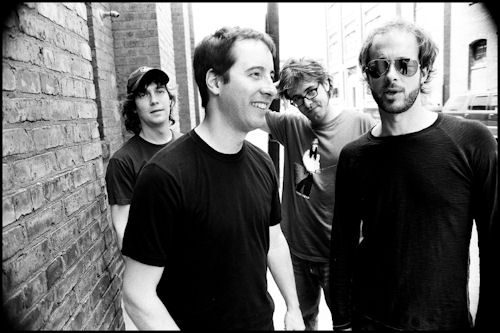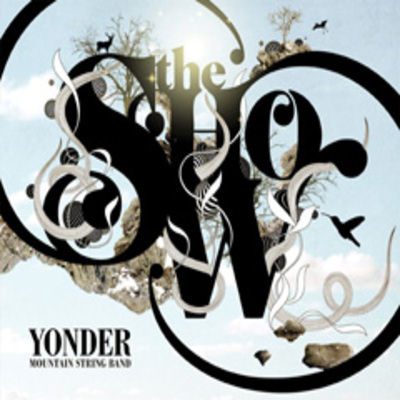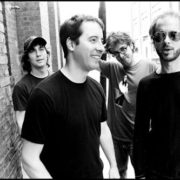YONDER MOUNTAIN STRING BAND:
A LITTLE BLUEGRASS BAND IS MAKING HISTORY
 With bullet-train speed Yonder Mountain String Band comes on at so many levels with such a vast soundscape it’s hard to find metaphors that can illustrate the energy and inspiration of their latest album (2009) The Show as well as their live performances. But, okay, I’ll try. This music, with rapid fire precision and pitch perfect inspiration, comes across as though Bluegrass legend Bill Monroe had been bred with Pink Floyd and midwife’d by The Grateful Dead. One listen to the first few tracks of this firebrand recording and it becomes clear we’re operating in the rare artistically seasoned land of The Beatles’ Sgt. Pepper. Before you cry ‘over-the-hyperbolic-top’ let me say this comparison is without any delusion that this or any record of the last 40 years stands a chance of approaching the influential iconic status of Pepper, but if a record and band can be captured at the peak of their potential and powers in studio production, arrangement, song craft, performance and concept, Yonder Mountain String Band has demonstrated this on The Show and during concerts over the last several years.
With bullet-train speed Yonder Mountain String Band comes on at so many levels with such a vast soundscape it’s hard to find metaphors that can illustrate the energy and inspiration of their latest album (2009) The Show as well as their live performances. But, okay, I’ll try. This music, with rapid fire precision and pitch perfect inspiration, comes across as though Bluegrass legend Bill Monroe had been bred with Pink Floyd and midwife’d by The Grateful Dead. One listen to the first few tracks of this firebrand recording and it becomes clear we’re operating in the rare artistically seasoned land of The Beatles’ Sgt. Pepper. Before you cry ‘over-the-hyperbolic-top’ let me say this comparison is without any delusion that this or any record of the last 40 years stands a chance of approaching the influential iconic status of Pepper, but if a record and band can be captured at the peak of their potential and powers in studio production, arrangement, song craft, performance and concept, Yonder Mountain String Band has demonstrated this on The Show and during concerts over the last several years.
After an hour of conversation with bass player, Ben Kaufmann, it’s clear to see when an artist dreams big, the results can often be found to be as big. While they have the distinction of being the only bluegrass band to open for the first African-American Democratic candidate for President of the United States at the 2008 Democratic Convention, it seems that Kaufmann’s even-handed perspective suggests this is but one dream fulfilled with many more to come. During the course of our interview we covered traditional and modern bluegrass, the cultural universal language of music and bringing Zen to stage performance.
With 12 years of musical history, Ben Kaufmann is readying himself to compile historical band footage as the band embarks on a new North American tour. One thing is clear, with their dreams come great visions and if their live performances and studio work is an indication, they’ve only just begun.
TR: So what’s been happening lately?
BEN: I’ve been going to film school. Over the course of 12 years I’ve accumulated an absurd amount of video archives of the band. A lot of it is on VHS. I went to film school in NYC before for digital. So, I’ve had to get caught up on Final Cut. We have recording rehearsals, audio tracks. I want to do a film looking backwards. I’m making a film about the band.
TR: So you are probably the only bluegrass band to open for a presidential candidate.
BEN: Yeah. We were asked to appear at the Democratic convention in Denver for Barack Obama’s nomination.
TR: How did that happen?
BEN: There was a guy on the planning committee who wanted a Colorado band and he happened to come to one of our shows. We submitted some of our songs and they said yes for us to appear there. We don’t really like to get political though. We don’t want to be identified with politics.
TR: What was it like there?
BEN: The energy was massive. Everyone there was high on change, you know. I made a comment to some media outlet that you’ve got to be worried when you’re selling hope and change if you don’t back it up. You know, it was so hyped up then with Obama and the Democrats, but, then, recently, there’s been the chronic inability to explain what’s been changed.
TR: So was there much footage of the band playing their set?
BEN: Yeah, there’s the CNN clip of Wolf Blitzer talking as we’re playing in the background. He’s trying to make comments, but we’re playing with so much volume he has to say, ‘let’s stop and listen to this thing.’ You know, from the beginning he should’ve been paying attention to us! At first we just look like this bluegrass band, but then, the volume pushes him into the background.
TR: Let’s talk about your style.
Ben: We’ve been identified with ‘new grass.’ We have the traditional influences like Dave’s banjo comes from Earl Scruggs, but we also draw from musicians like John Hartford. I came to it through Bela Fleck. As a band, we’re not traditionalists; we represent that other end of the spectrum.
TR: I can hear a lot of influences, or maybe it’s just who you are…… I really hear The Grateful Dead.
BEN: I was not a whole lot into the Dead. But the other three guys were. I like them more now. We’ve had the opportunity to play with them, with Mickey Hart and Bob Weir. At one point we even got off stage and jammed off to the side. It wasn’t until this that I realized the importance of the band in the history of music. Playing with them, it really hit home. I feel there’s a similarity also in the relationship with the band and the fans. We have a similar energy between us.
TR: What about the traditional vs. progressive sound in terms of bluegrass?
BEN: We keep evolving, so now we don’t think too much about tradition. The kind of gigs we’ve been playing, we don’t really interact too much with traditionalists. We’re kind of a second generation. Artists like Sam Bush and Bela, these guys really get what we’re doing. We’re putting together really good songwriting with instrumental performance. Our shows are really high energy. Our development as a band comes from within the system. Influences can come from outside, but to write what we write, we have an idea of what it’s going to sound like and ends up being natural. We don’t think about it too much. As far as traditionalists go, we don’t really care if they like us or not. At the same time, they’re worried that traditional bluegrass is dying and it will if it remains so closed. It’ll be harder to find.
TR: Are there any artists out there similar to Yonder who are trying to balance between modern and traditional bluegrass?
BEN: Well, artists like Del McCoury are translating the old traditions, like the one-mic technique, into the spirit. There’s the bluegrass band from the Navy (Country Current/the U.S. Navy Bluegrass Band)…I really liked them. Unbelievable sound.
TR: What’s coming up in the future for you?
 BEN: We’re working on a new record. The last two have had large budgets with great producers. We want to get back to the basics on this new one. The ultimate goal is to try to capture what we do live in the studio. A way to present the songs and the performance. To bridge the gap. I find it to be challenging. But, right now, we’re just recording songs and trying to lay down as much as we can. Sometimes things do get predictable. So, we’d like to mix it up a bit.
BEN: We’re working on a new record. The last two have had large budgets with great producers. We want to get back to the basics on this new one. The ultimate goal is to try to capture what we do live in the studio. A way to present the songs and the performance. To bridge the gap. I find it to be challenging. But, right now, we’re just recording songs and trying to lay down as much as we can. Sometimes things do get predictable. So, we’d like to mix it up a bit.
TR: How do you mean?
BEN: Like you put out a record and then you tour behind the record. Right now, we’d like to get out of North America. Go to Japan, England, go over for some festivals. Usually, you have to go to the festivals first and then follow that up with clubs. You have to have a way of establishing the band. Also, I have this idea of Australia. We really like to set up a tour there.
TR: Sounds like there’s quite a bit of expansion on the horizon.
BEN: Well, I’ve always had big dreams. To get out and do be able to do a lot of traveling opens your perspective. And to be able to travel and speak solely through music is really an opportunity. Years ago, we did this country music rendezvous in France and we had to rely on the music to speak for us. People didn’t understand a lot of the words. You know, it was during that French fry/freedom fry. We were able to connect and feel how music transcends politics. The show got so energized, the audience wasn’t letting us off stage. Music and art have always been that, a place for hope. And ultimately, we’re really just a bluegrass band.
TR: I noticed you paid homage to Zen Buddhist monk Thich Nhat Hanh. Tell me about how spirituality informs your work.
BEN: Well, for me it all speaks of life. When my dad passed away I was grossly unprepared. I found myself having to speak to these questions about life and death. What I found in Buddhism was that it addresses every question in a very humanistic way. It’s based on experience, not a leap of faith. Everything is tested; you touch it, think about it. Tich Nhat Hanh’s writing helped me so much to be in the present. That translates into moments when I’m performing on stage (or in the studio). If I get lost in my thoughts or ego, I just return to the essence of the music in that moment.
TR: And that’s meditation.
Ben: Yes, it is.
For more information about the YMSB’s current tour go to www.yondermountain.com
Terry Roland is an English teacher, freelance writer, occasional poet, songwriter and folk and country enthusiast. The music has been in his blood since being raised in Texas. He came to California where he was taught to say ‘dude’ at an early age.
YONDER MOUNTAIN STRING BAND:
A LITTLE BLUEGRASS BAND IS MAKING HISTORY













